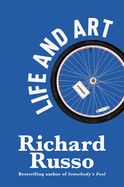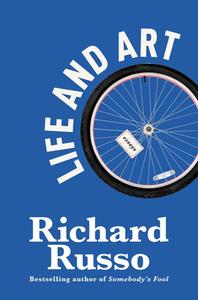
 Though he's best known as the author of novels including his Pulitzer Prize-winning Empire Falls and the North Bath Trilogy, Richard Russo is also a perceptive and empathetic essayist and critic. That skill is manifest in his second nonfiction collection, Life and Art.
Though he's best known as the author of novels including his Pulitzer Prize-winning Empire Falls and the North Bath Trilogy, Richard Russo is also a perceptive and empathetic essayist and critic. That skill is manifest in his second nonfiction collection, Life and Art.
In the seven pieces that compose the book's "Life" section, Russo (The Destiny Thief) examines America's troubling tribal culture ("Stiff Neck"), considers the effect of the Covid-19 lockdown on his writing life ("Triage"), and tells a remarkable story of how a lost wedding ring reminded him that "stories... are incubators of meaning" ("Meaning"). Several of the remaining essays in this portion reflect from different angles on his relationship with his parents and his upbringing in the mill town of Gloversville, N.Y., named for the industry that provided its main source of employment until its collapse and that inspired him to create its fictional alter ego.
As Russo portrays it in "A Marriage Story," his parents were a badly mismatched pair. They separated during his childhood, after which he and his mother moved into an upstairs apartment in a home purchased by his maternal grandparents. They eventually landed in Arizona when he left to attend college. Although his father's proclivity for gambling away the earnings from his job as a construction worker and closing down Gloversville's bars was the proximate cause of their split, Russo plumbs the depths of their unhappiness. He locates the roots of the breakdown in the irreconcilable clash between his father's fundamentally dark view of American life after returning from heroic service in World War II and his mother's "patriotic optimism."
In Life and Art's "Art" section, Russo offers six essays that touch on an assortment of topics related to the writing and teaching to which he has devoted his life. Among the most intriguing is "The Future." In it, he explains why, for him, the 1969 film Butch Cassidy and the Sundance Kid presents a thoughtful study of disruption, illuminating how the changes in the world in which these outlaws first thrived and then failed reflect contemporary economic and social changes. In "Words and Their Arrangement," he efficiently dissects iconic singer-songwriter Townes Van Zandt's song "Pancho and Lefty" to reveal how "great art, it seems, can be made of humble materials."
That statement, in fact, is an apt characterization of Russo's own approach to his craft. As is true of his fiction, he's a direct and plainspoken stylist. But that lack of affectation should not be confused with an absence of depth. Despite their brevity and transparency, Life and Art's insightful explorations offer more grist for contemplation than many longer and superficially more complex works. --Harvey Freedenberg, freelance reviewer
Shelf Talker: In 13 cogent essays, novelist Richard Russo candidly reflects on aspects of his personal and professional life.

